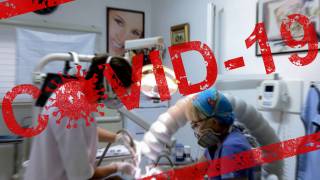Insights: Caring for Women Who Are Planning a Pregnancy, Pregnant, or Postpartum During the Coronavirus Pandemic

Since its recognition in China in December 2019, COVID-19 disease has rapidly spread throughout the world and become a pandemic.
Although considerable data on COVID-19 are available, much remains to be learned about its effects on pregnant women and newborns comments a JAMA Insights, published on June 5, 2020.
Excerpts are integrated below:
There is no data currently available to assess whether pregnant women are more susceptible to COVID-19 disease.
Pregnant women are at risk for severe disease associated with other respiratory illnesses (eg, 2009 H1N1 influenza), but thus far, pregnant women with COVID-19 do not appear to be at increased risk for severe disease compared with the general population.
Data from China showed that among 147 pregnant women, 8% had severe disease and 1% had a critical illness, which is lower rates than observed in the nonpregnant population (14% with severe disease and 6% with critical illness).
Case series from China consisting primarily of women with a third-trimester infection have shown that clinical findings in pregnant women are similar to those seen in the general population.
Conversely, a small Swedish study reported that pregnant and postpartum women with COVID-19 were 5 times more likely to be admitted to an intensive care unit compared with nonpregnant women of similar age.
Data on pregnant women with COVID-19 in the US are beginning to accumulate.
For example, a recent report included 43 pregnant women with COVID-19 who presented for care at 2 hospitals in New York City. Although this case series did not include a nonpregnant control group, the proportion of pregnant women with severe disease was similar to that described in nonpregnant adults with COVID-19.
More information is needed about the effect of pregnancy and comorbidities to understand how they affect clinical outcomes of COVID-19. The US experience might differ from other countries because of the high frequency of comorbidities among pregnant women in the US.
The effects of COVID-19 during pregnancy on the neonate are not well understood. Nearly all infections reported from China were during the third or late-second trimester, so whether first-trimester SARS-CoV-2 infection might cause birth defects or pregnancy loss is unknown.
Some newborns born to mothers with COVID-19 during pregnancy were born preterm or of low birth weight, but whether these outcomes were COVID-19–related is unclear. SARS-CoV-2 transmission from a mother to her newborn could occur prenatally, perinatally, or postnatally. In most newborns tested after birth, results have been negative for SARS-CoV-2.
However, symptomatic newborns born to mothers with COVID-19 have been reported to have SARS-CoV-2 infection at a few days of life; whether this was due to prenatal, perinatal, or postnatal transmission is unknown.
Recently, a probable case of congenital infection was reported in a newborn born to a woman with familial neutropenia who was diagnosed with COVID-19 before delivery. A neonatal nasopharyngeal swab collected on the day of birth prior to skin-to-skin maternal contact was positive.
The presence of IgM and IgG antibodies in 3 infants born to mothers with COVID-19 during pregnancy was recently reported. IgG antibodies freely cross the placenta; however, IgM antibodies do not typically cross the placenta, suggesting the possibility of prenatal transmission of SARS-CoV-2.
However, these studies do not provide definitive evidence for intrauterine transmission because cross-reactivity and false-positive IgM test results can occur. Whether transmission can occur through breastfeeding is unknown.
SARS-CoV-2 RNA has been detected in breastmilk samples from a single woman with COVID-19, and her infant tested positive for SARS-CoV-2, but whether the infant was infected through breastfeeding is unclear. Given the benefits of breast milk, when feasible, breast milk should be fed to infants regardless of maternal COVID-19 status.
Based on experiences with other infections (eg, influenza), adverse effects on the fetus or newborn related to prenatal infection might occur even without intrauterine transmission. For example, severe maternal illness with influenza requiring intensive care unit admission was associated with increased risks for preterm birth, low birth weight, and low Apgar scores.
Whether an increased risk for adverse outcomes among newborns born to women with COVID-19 will be seen is unknown.
Given the limited data, recommendations for caring for women who are planning a pregnancy, pregnant, or have given birth during the COVID-19 pandemic are based on expert opinion. Women planning a pregnancy in the time of COVID-19 might ask whether they should delay pregnancy until after the pandemic.
Based on limited data, there does not seem to be a compelling reason to recommend delaying pregnancy. For women who are pregnant, the primary recommendation is to avoid becoming infected with SARS CoV-2 through hygiene and social distancing measures.
Early recognition of COVID-19 in a pregnant patient admitted to a labor and delivery unit is necessary so appropriate infection control practices can be instituted. Given that some women with COVID-19 might be asymptomatic or presymptomatic, health care facilities may consider polymerase chain reaction testing for SARS-CoV-2 at the time of admission.
Guidelines for the care of pregnant women known or suspected to have COVID-19 admitted for delivery have been developed by the US Centers for Disease Control and Prevention (CDC) and several professional organizations.
On presentation, a mask should be placed on the woman and she should be isolated in a single-patient room with the door closed, with an airborne isolation room used for aerosol-generating procedures. Clinical care of a pregnant woman with COVID-19 should be based on illness severity; diagnostic measures and treatments should not be withheld based on pregnancy status.
Given the risks of maternal respiratory depression, consideration should be given to limiting the use of magnesium sulfate for seizure prophylaxis and fetal neuroprotection. Given concerns about potential harm from corticosteroid use in patients with COVID-19, antenatal corticosteroid use for fetal maturation should be carefully considered and should depend on the gestational age.
Access to peer-reviewed information on COVID-19 is changing rapidly. As additional data become available recommendations might change, so clinicians should follow the CDC website and those of professional organizations for updates,’ concluded this JAMA Insight.
Corresponding Author: Denise J. Jamieson, MD, MPH, Department of Gynecology and Obstetrics, Emory University School of Medicine.
CoronavirusToday publishes research-based news.
Our Trust Standards: Medical Advisory Committee

























